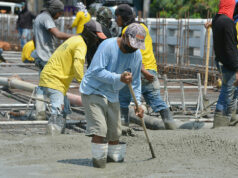Carpio steps back from West Philippine Sea case
SENIOR ASSOCIATE Justice Antonio T. Carpio has inhibited himself from the petition asking the government to enforce environmental laws to protect and preserve three shoals in the West Philippine Sea.
Supreme Court (SC) Public Information Chief Brain Keith F. Hosaka said the justices in the en banc session on July 2 accepted the “voluntary inhibition” of Mr. Carpio, who did not attend Tuesday’s oral arguments on the petition.
“According to him the reason why he is inhibiting himself voluntarily is because it is for the peace of mind of the parties, particularly the Sol-gen (Solicitor General),” Mr. Hosaka said in a press briefing.
The Office of the Solicitor General on June 27 filed a motion before the high court to inhibit Mr. Carpio from participating in the petition for his “personal bias and manifest partiality.”
It cited Mr. Carpio’s active participation in the South China Sea Arbitral Proceedings and his public pronouncements on the actions of the government in relation the arbitral award.
The associate justice was among the delegates in the proceedings at the Permanent Court of Arbitrations against China over the territorial dispute in the South China Sea.
The tribunal on July 2016 invalidated the nine-dash line claim of China, ruling in favor of the Philippines and its exclusive sovereign rights in the West Philippine Sea.
A group of fisherfolk from Palawan and Zambales asked the Supreme Court to compel the government to enforce environmental laws, claiming that it has refused to take legal action against those who commit violations, specifically the Chinese.
The petitioners also cited the Philippine Fisheries Code, which mandates the government to prosecute those who commit illegal acts and noted the findings of the 2016 arbitral tribunal that Chinese fishing vessel were harvesting endangered species in Panatag and Ayungin Shoal.
They also cited that in May 2013, two Chinese fishing vessels along with two Chinese Marine Surveillance ships were spotted near Ayungin Shoal.
During yesterday’s oral arguments, Associate Justice Andres B. Reyes, Jr. asked the legal counsel of the petitioners, Andre C. Palacios, if the government is enforcing border laws by placing a guard or soldiers at the Ayungin Shoal.
Mr. Palacios said while the government is doing this, it should go further by prosecuting criminal offenses.
Mr. Andres also said that the country has only seven boats that are capable of “long run in the high seas and we don’t have adequate coast guard ships.”
“We are 7,107 islands and we don’t have the money, I think, the resources to have a ship there every minute of the day. If you go to this part of the sea, they (Chinese) will go to the other part of the sea,” he said.
“So it’s not an easy thing to enforce so that’s why I just feel sad that you are asking for enforcement and I just feel sad that our country cannot do it… to enforce our laws we don’t have enough money we cannot even pay our soldiers, policemen properly. And here we are demanding that we enforce something in the high seas and you don’t even peg the value of how much are stolen from our fishes,” he added.
The oral arguments will resume on July 9.
In Malacañang, Spokesperson Salvador S. Panelo said the President wants assurance from China that the rights and safety of Filipino fishermen in the disputed waters of the West Philippine Sea “are guaranteed.”
In a statement, he said Mr. Duterte made his remarks during the Cabinet meeting last Monday.
“The Cabinet discussed the Recto Bank incident where PRRD told the Cabinet that the incident be discussed during the bilateral meetings with China. The President wanted China’s assurance that the rights and safety of our fisherfolk are guaranteed,” he said.
‘CLOSURE’
In another development, Justice Secretary Menardo I. Guevarra said the country cannot compel China to have a third party probe into the collision of a Chinese vessel and a Filipino fishing boat last month.
“If it doesn’t want to then you can’t do anything about it. So in that situation, assuming that there will be a disagreement as to the factual findings, I guess the two parties will just have to sort it out, continue to negotiate until a consensus is arrived,” he said in a press conference.
“We cannot force a party to do something it doesn’t want to do,” he added.
Presidential Spokesperson Salvador S. Panelo on Monday said he received a “report” from Philippine Ambassador to China Jose Santiago L. Sta. Romana saying China does not want a third party in the probe.
A Chinese vessel allegedly rammed a Filipino fishing boat last month and abandoned the 22 Filipino crew members as their boat sank.
The President’s spokesperson on Tuesday said Chinese Ambassador to the Philippines Zhao Jianhua has informed him that the Chinese government wants “closure” to the incident.
“Chinese would want also to put closure to [the issue]….” he said in a press briefing Tuesday.
He added that he received this information from Mr. Zhao via “text” message.
Asked how the Chinese camp worded the statement, he said: “Iyon nga (That’s it), we have to put closure to this because our relations are being affected.”
Mr. Panelo said this is also the position of Mr. Duterte, noting that both countries have good relations to protect.
“Every president wants to put closure to any incident that affects the presidency and the Filipino people; and for that matter, any country,” he said.
“Basta may incident na ganiyan, ayaw nilang papahabain iyan kasi (Whenever there are such incidents, they don’t want to prolong it because) it affects the relation ng dalawang bansa (of the two countries).”
Mr. Panelo said further that enforcing the 2016 international tribunal ruling on the West Philippine Sea favoring the Philippines will “only precipitate or trigger an armed conflict that could escalate into continuing bloody encounters detrimental to the national interest.”
By not going into war with China, he said, “you protect the marine wealth, you protect the Filipino lives, and everything.”
‘VERBAL AGREEMENT’?
At the Senate, Senator Sherwin T. Gatchalian said on Tuesday that Mr. Duterte’s supposed “verbal agreement” with Chinese President Xi Jinping should be tackled in the 18th Congress, which opens July 22.
The senator, who chaired the committee on economic affairs in the 17th Congress, also noted that the agreement should be embodied in a formal document for transparency and better implementation.
“Without the details, it’s very difficult to speculate. This can be a discussion, but wala pang (no) implementation (yet), so again we need to understand this in Congress and the Senate,” Mr. Gatchalian, who is expected to remain economic affairs committee chair based on the “equity of the incumbent” principle in the Senate, told reporters in a chance interview.
He said the issue could be jointly discussed by the committees on foreign relations and economic affairs.
“In my opinion, dapat (it should be) written and dapat maintindihan ‘to ng Kongreso at hindi lang ‘yung (it should be understood by Congress, and not just some) verbal agreement,” he said, “but also how do you implement that, how do you enforce this type of agreement and what are the benefits to us?”
For his part, Senator Panfilo M. Lacson said he sees that the agreement should be taken at face value, considering the Department of Foreign Affairs and the Department of National Defense have not taken actions to implement it.
In a statement on Tuesday, Mr. Lacson said, “A verbal agreement between President Duterte and President Xi is what it is — a verbal agreement. Is that verbal agreement already part of our national policy? Is it being carried out? It is my humble view that it is not. Why? There is no showing that the Department of Foreign Affairs as well as the Department of National Defense are implementing that so-called verbal agreement.” — Vann Marlo M. Villegas, Arjay L. Balinbin and Charmaine A. Tadalan



